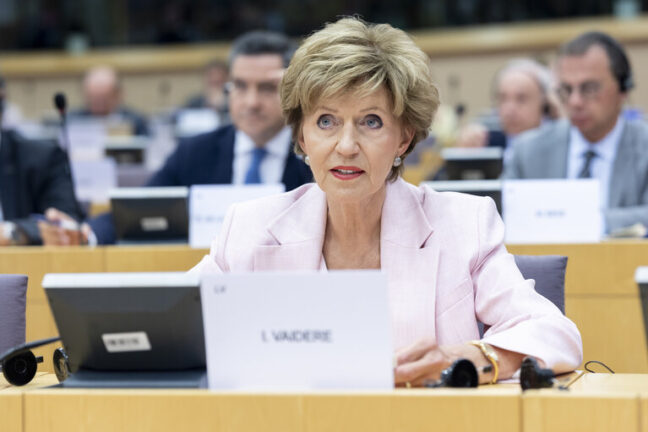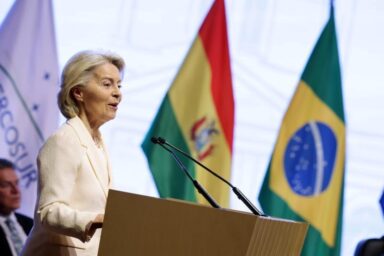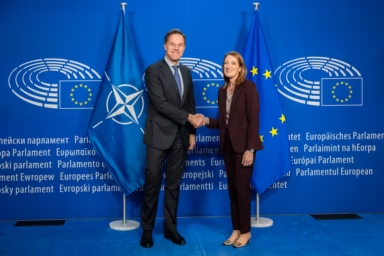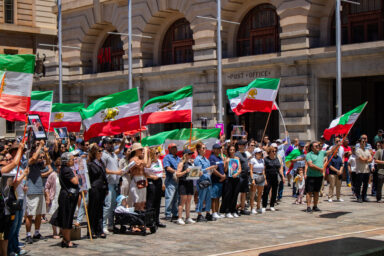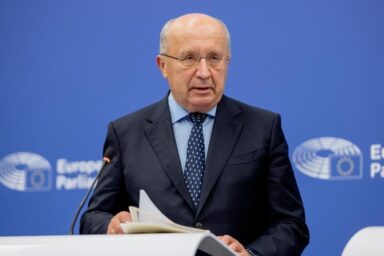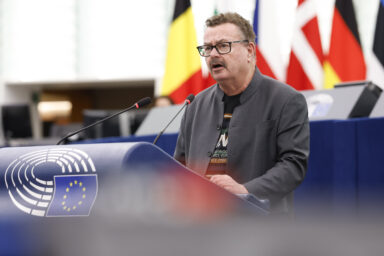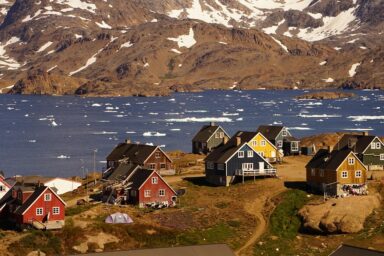In its latest effort to undercut Russia’s ability to finance its war in Ukraine, the European Union has adopted its 18th sanctions package targeting Moscow’s vital energy, banking, and military sectors. At the heart of the new measures, endorsed by EU leaders on 18 July, is a dynamic oil price cap designed to erode Russia’s revenue while keeping global markets stable.
The new price ceiling replaces the static $60 per barrel cap introduced by the G7 in 2022, which had become largely ineffective due to fluctuating oil prices. Under the new system, the EU will enforce a price cap 15 per cent below the global market rate. That currently stands at around $47.60 per barrel. The cap will go into effect on 3 September and includes a 90-day transition period for existing contracts. With the UK already committed, the EU is urging the US to follow suit to maximize the price cap’s effectiveness.
European Commission President Ursula von der Leyen embraced the package as a direct strike at “the heart of Russia’s war machine. “I welcome the agreement on our 18th sanctions package against Russia. The pressure is on. It will stay on until Putin ends this war,” she wrote on X.
Cutting off backdoor imports
The new package also includes measures targeting Russia’s so-called “shadow fleet”, a network of aging, often poorly insured oil tankers operating under murky ownership to evade sanctions. An additional 105 vessels will be banned from EU ports and locks. That will bring the total to 444 tankers prohibited from accessing European waters or engaging in ship-to-ship transfers. The EU also targeted key actors within the shadow fleet system, including the captain of a sanctioned vessel, and a private operator of a foreign flag registry. Indian refinery Nayara Energy, partly owned by Russia’s Rosneft, has also been sanctioned for its role in processing Russian crude.
The sanctions extend to banning the import of refined petroleum products made from Russian crude oil, even if they originate from third countries. Exceptions are select allies such as Canada, Norway, the UK, Switzerland, and the US. Through this extension, the EU aims to block backdoor entry routes for Russian energy into the EU market.
You might be interested
No ‘business as usual’ with Russia
The package further includes a ban on investing in, maintaining, or supplying the Nord Stream 1 and 2 pipelines. The gas corridors, which connect Russia and Germany through pipelines under the Baltic Sea, were once central to Europe’s energy dependency on Russia.
Beyond energy, the sanctions hit Russia’s financial system. Twenty-two additional Russian banks have been slapped with full transaction bans. The EU has also lowered the bar for sanctioning third-country banks and crypto-asset service providers that facilitate sanctions evasion or are linked to Russia’s SPFS -Moscow’s alternative to the SWIFT payment system.
Military suppliers, particularly in China, Hong Kong, Türkiye, and Belarus, also face tighter export controls on dual-use goods and technology. The package includes bans on computer-controlled cutting machines (CNCs) and chemicals that can be used to make explosives, totaling €2.5bn in restricted exports.
Phasing out Russian gas
Reaching a consensus wasn’t easy. Slovakia blocked the sanctions package for weeks, protesting parallel Commission plans to completely phase out Russian oil and gas imports by the end of 2027. The proposal, which the Commission presented last month, would mark the EU’s most definitive break yet from the energy source that for years underpinned its relationship with the Kremlin.
Last week, Danish Energy Commissioner Dan Jørgensen discussed the Commission’s plans to phase out Russian gas imports (something Parliament already called for back in 2022) with MEPs during a joint meeting of the International Trade and Industry Committees.
Jørgensen highlighted the progress made so far in reducing the EU’s dependency on Russian energy: “In 2022, the EU depended on Russia for 51 per cent of its coal, today that’s zero. Oil dropped from 27% to 3%, and gas from 45% to 13%.” But he warned: “Putin can still weaponise energy. And we are still helping him finance his war machine. The amount we’ve spent buying Russian energy since 2022 equals the cost of 2,400 F-35 fighter jets. That’s the scale.”
The Commission’s proposed timeline introduces a two-step ban: from June 2026, short-term contracts for Russian gas would be prohibited, while long-term contracts, such as those between Russian state company Gazprom and EU buyers, would need to be fully phased out by January 2028.
Trade rules, not sanctions
These are not sanctions, but binding trade measures anchored in the EU’s internal market rules. As such, they can be enforced without requiring unanimity from all member states. Since Slovakia would not be able to block these measures, it expressed its discontent by withholding approval of the sanctions package where it did have this political leverage.
While the majority of MEPs welcomed the proposal, Parliament would like to see it move faster and be more ambitious. Co-rapporteurs Ville Niinistö (Greens/FI) and Inese Vaidere (EPP/LV) called for the deadline to be brought forward to 1 January 2027, also echoed by Ľubica Karvašová (Renew/SK). Commissioner Jørgensen explained that the cautious timeline aimed to reassure member states with lingering concerns.
The co-rapporteurs, along with several other MEPs, also pushed for the inclusion of oil, oil derivatives such as petroleum, and nuclear fuel. Ryszard Czarnecki (ECR/PL) and Francesco Assis (S&D/PT) both underlined that “true autonomy” requires phasing out all forms of Russian energy.
Emergency brake
Another key concern for MEPs is the inclusion of Article 15, which allows the Commission to authorise member states to temporarily suspend the import ban in case of sudden and significant developments that seriously threaten the security of energy supply. For Slovakia, this possibility to soften the import ban in case of extreme prices was crucial, and this concession by the Commission was what led the country to retract its veto from the sanctions package.
The rapporteurs, however, warned that this emergency brake risks being exploited by member states and companies seeking to avoid the rules. “We must not let this clause weaken the impact,” Ms Vaidere said. Ms Karvašová added that rather than looking for potential derogations, the Commission should focus on stopping Russian imports beyond just the wartime context: “Weaponisation started before the war as well. There’s no going back to business as usual as long as we deal with Putin, or a similar regime.” Commissioner Jørgensen stressed that the emergency clause would only apply in exceptional circumstances and only with Commission approval.
Additional concerns
At the same time, MEPs raised concerns about the legal robustness of the plan. Many European countries are still bound by contracts with Russian gas suppliers, which could make them vulnerable to legal action, especially in Central and Eastern Europe, where long-standing deals with Gazprom remain in place.
Various MEPs, including Andrea Wechsler (EPP/DE), also emphasised the need for the Commission to reassure European households that they won’t be the ones paying the price. Raffaele Stancanelli (PfE/IT) even warned against a complete stop to all Russian imports: “We have to be pragmatic. Not too focused on ideology. Totally cutting imports would be a vulnerability,” he said.
Commissioner Jørgensen noted that he would take MEPs’ “legitimate” concerns into account in upcoming discussions with Parliament and the Council.
